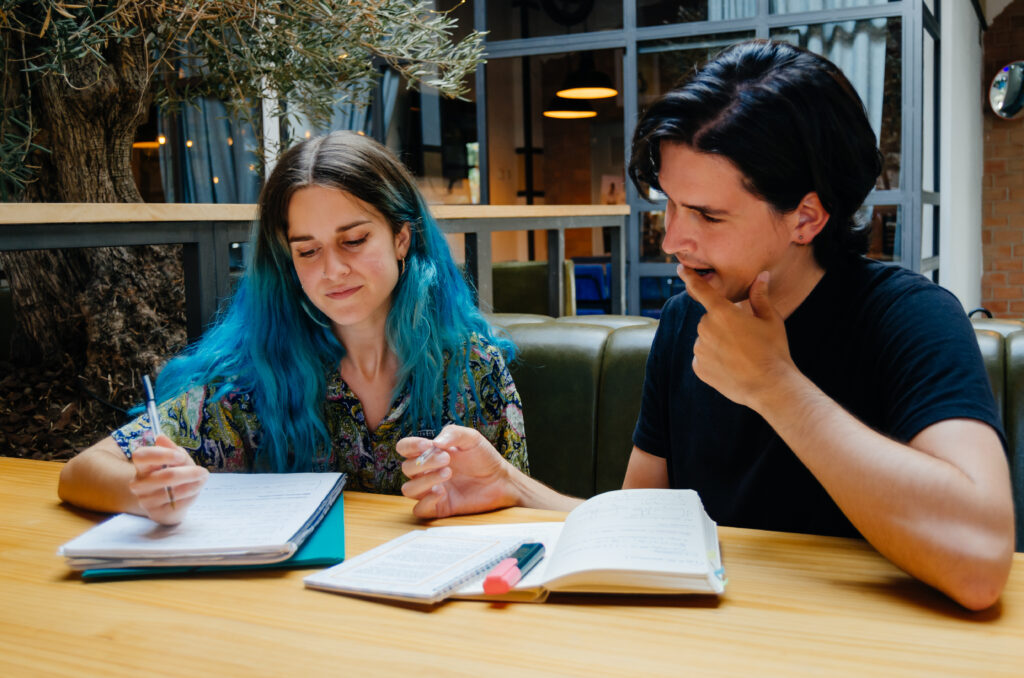Are you planning to learn German and wondering how long it takes to reach B1 or B2 levels? If you are moving to Germany for school or work, this guide is for you. It will provide key information on how long it usually takes to become fluent in German. You will also learn how many hours you need to study.
In this blog post, we will discuss how long it takes to reach B1 or B2 in German. We will cover the study hours needed and share expert tips to help you learn faster. Additionally, we’ll show you how our language institute and consultancy can support you every step of the way.
What is B1 and B2 in the CEFR Levels?
Before we check the timeline, let’s understand what B1 and B2 levels mean. These levels are part of the Common European Framework of Reference for Languages (CEFR).
- B1 (Intermediate): You can talk in everyday situations. You understand the main points of clear information. You can manage work, travel, and social interactions easily.
- B2 (Upper Intermediate): At this level, you can speak fluently and write detailed texts. You can also understand complex discussions and join debates in German.
How Long Does It Take to Learn German Up to B1?
For those starting from scratch, reaching B1 in German involves steady commitment and regular practice.
Average Timeframe for B1:
- For beginners: Typically 6 to 8 months of consistent study to reach B1.
- For those with some language experience: You might achieve B1 in 5 to 6 months.
Study Hours Required:
- On average, you’ll need 350 to 400 hours of study to move from A0 to B1.
How Long Does It Take to Learn German Up to B2?
Progressing from B1 to B2 generally takes more time as you develop deeper language skills and understanding.
Average Timeframe for B2:
- For beginners: It typically takes around 12 to 18 months of consistent study to reach B2 from scratch.
- For those at B1 level: Expect to spend around 6 to 8 months moving from B1 to B2.
Study Hours Required:
- You need around 500 to 600 hours of study to progress from B1 to B2.
Factors Affecting Your Learning Speed
Several factors affect the speed of your progress:
- Consistency: Regular study and practice are crucial for faster results.
- Study Methods: Combining self-study with structured language courses and immersion will yield quicker results.
- Language Environment: Exposure to the language through media (TV shows, podcasts) and conversations with native speakers speeds up learning.
- Goal-Oriented Approach: Setting clear goals and sticking to them helps you stay motivated and focused.
How We Can Help You Learn German Faster
As a top language school, we help students and professionals reach B1 and B2 levels in German quickly. We design our structured courses to suit both beginners and those looking to improve their skills.
Here’s how we can help:
- Customized German Language Programs: We offer courses for beginners to advanced learners. These programs fit your learning pace. Whether you are preparing for exams or want to improve your communication skills, we can help.
- Intensive Courses: If you want to learn German quickly, we have intensive courses. These courses help you reach B1/B2 levels fast.
- Certified Instructors: Our skilled and certified German teachers will help you at every step. They provide personal feedback and support.
- Flexible Study Options: We offer online and in-person classes to fit your schedule. You can choose flexible timings and study at your own pace.
Tips to Speed Up Your German Learning Journey
- Immerse Yourself: The more you interact with the language, the faster you’ll learn. Practice speaking with native speakers, watch German TV shows, and read German articles.
- Use Language Apps: Apps like Duolingo or Babbel are great for learning vocabulary and grammar on the go.
- Daily Practice: Set aside dedicated time for language practice, especially speaking and listening.
- Join Group Sessions: Practicing with others in group sessions can help you improve quicker, as you’ll have real conversations.
- Intensive Learning: Our intensive language courses can speed up your progress if you need to reach a higher level in less time.
How We Can Help You Find a Job in Germany
As a consultancy, we specialize in helping Indian professionals find the right job opportunities in Germany. If you want to learn German to get a job in Germany, we can help you. This includes nursing, business, or engineering. We offer full support.
Our services include:
- Job Placement Assistance: We connect you with top employers in Germany and guide you through the application process.
- Work Visa Help: We help you with the visa application process. We make sure you meet all the requirements to work in Germany.
- Resume & Interview Prep: Our experts help you create a German-style CV and prepare for interviews in German.
- Ongoing Support: After you get a job, we offer support. This includes help with housing, work permits, and fitting into the culture.
Conclusion
Achieving B1 and B2 in German is a realistic goal with consistent study, dedication, and the right resources. By following the tips in this blog, you can quickly learn German. This will help you find exciting opportunities in Germany.
As a language institute and consultancy, we are here to support you every step of the way. Whether it’s German language courses or job placement in Germany, we offer tailored solutions to help you succeed.


